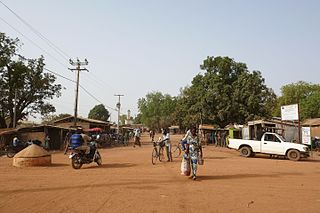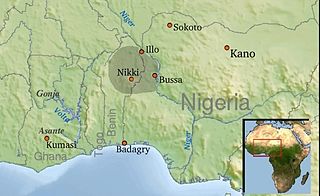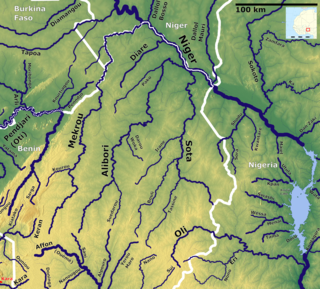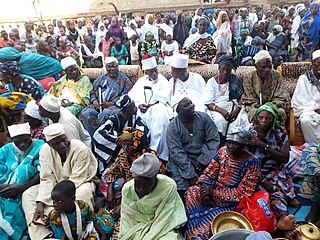Related Research Articles
These are lists of incumbents, including heads of states or of subnational entities.

The demographics of Benin include population density, ethnicity, education level, health of the populace, economic status, religious affiliations and other aspects of the population.

Atakora is the northwesternmost department of Benin. Externally it borders Togo to the west and Burkina Faso to the north; internally it borders the departments of Alibori, Borgou and Donga. Major towns in the Atakora include Natitingou and Tanguiéta, and the major tourist areas include the Tata Somba houses, Pendjari National Park, and various waterfalls. The department of Atakora was bifurcated in 1999, with its southern territory removed to form the newly created Donga Department. The capital of Atakora Department is Natitingou, which lies among the Atakora Mountains.

Boukoumbé or Boukombé is a town, arrondissement and commune in north western Benin on the border with Togo. It is known for its market, its whipping ceremony and for its tradition of pipe making. Mount Kousso-Kovangou, the highest point in Benin, lies nearby.

Borgu is a region in north-west Nigeria and in the northern Republic of Benin. It was partitioned between Great Britain and France by the Anglo-French Convention of 1898. People of Borgu are known as Bariba or Borgawa.
Kouandé is a town, arrondissement and commune, located in the Atakora Department of Benin.The commune covers an area of 4500 square kilometres and as of 2013 had a population of 112,014 people. The main town had an estimated 7,127 people in 2008.
Nikki is a town, arrondissement, and commune located in the Borgou Department of Benin. The commune covers an area of 3171 square kilometres and as of 2002 had a population of 99,251 people.

The departments of Benin are subdivided into 77 communes, which in turn are divided into arrondissements and finally into villages or city districts. Prior to 1999 provinces were broken down into 84 districts, titled either urban or rural. Before independence, the six provinces were subdivided into Cercles, cantons, préfectures and villages or towns.

The following outline is provided as an overview of and topical guide to Benin:
Busa, or Bisã, is the Mande language of the former Borgu Emirate in northwestern Nigeria and northern Benin. It is called Busanci in Hausa, and has also been called Zugweya.

The Mékrou River is a river of Benin, Burkina Faso, and Niger. It flows through the W National Park.

The Bariba people, self designation Baatonu, are the principal inhabitants of Borgou and Alibori Departments, Benin, and cofounders of the Borgu kingdom of what is now northeast Benin and west-central Nigeria. In Nigeria, they are found spread between western Kwara State and the Borgu section of Niger State. There are perhaps a million Bariba, 70% of them in Benin, where they are the fourth largest ethnic group and comprise approximately 1/11 of the population (9.2%).
Benin, officially the Republic of Benin, is a country in Western Africa. It borders Togo to the west, Nigeria to the east and Burkina Faso and Niger to the north; its short coastline to the south leads to the Bight of Benin. Its size is just over 110000 km2 with a population of almost 8500000. Its capital is the Yoruba founded city of Porto Novo, but the seat of government is the Fon city of Cotonou. About half the population live below the international poverty line of US$1.25 per day.
Guilmaro is a town and arrondissement in the Atakora Department of northwestern Benin. It is an administrative division under the jurisdiction of the commune of Kouandé. According to the population census conducted by the Institut National de la Statistique Benin on February 15, 2002, the arrondissement had a total population of 6,516.
Oroukayo is a town and arrondissement in the Atakora Department of northwestern Benin. It is an administrative division under the jurisdiction of the commune of Kouandé. According to the population census conducted by the Institut National de la Statistique Benin on February 15, 2002, the arrondissement had a total population of 15,839.
Bariba, also known as Baatonum, is the language of the Bariba people and was the language of the state of Borgu. The native speakers are called Baatombu, Barba, Baruba, Berba and a number of various other names and spellings.
Childbirth practices in Benin are strongly influenced by the sociopolitical structure of the West African country.
Boko, or Boo, is a Mande language of Benin and Nigeria.
Mokole is a Yoruboid language spoken in the villages surrounding the town of Kandi in Benin. Its speakers constitute a sub-group of Yoruba originated people that are often attached to the Bariba people of Benin.
Akpaki Dagbara II was the king of the Bariba State of Paraku, in eastern Benin, until his death in 2004. The throne remained vacant for almost eight years. Two candidates, one designated by the Baparapé chief, the other by chief of Gbégourou, both customarily empowered to appoint the successor of a deceased king, had battling for the throne. In 2012 Akpaki Boukou Kinnin II rose to become the king of State of Paraku.
References
- ↑ "Benin traditional polities". Rulers.org. Retrieved 2014-06-18.